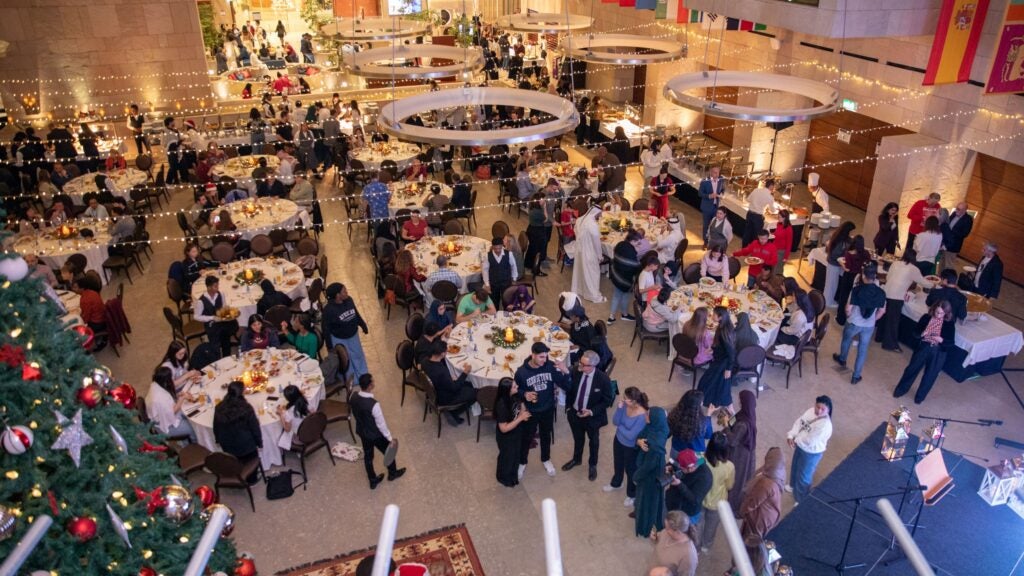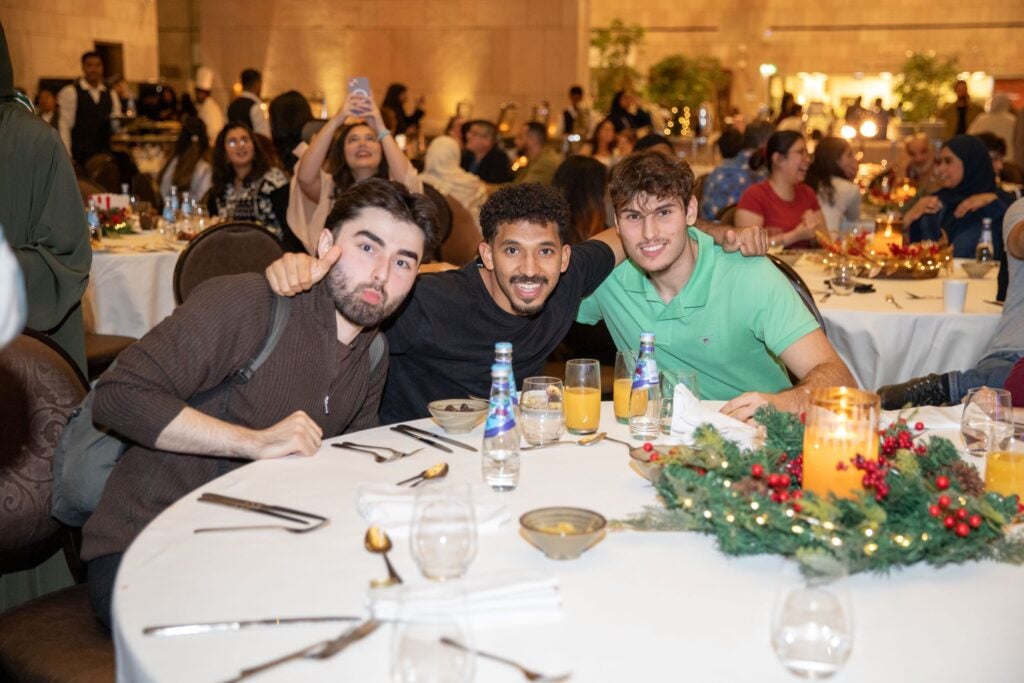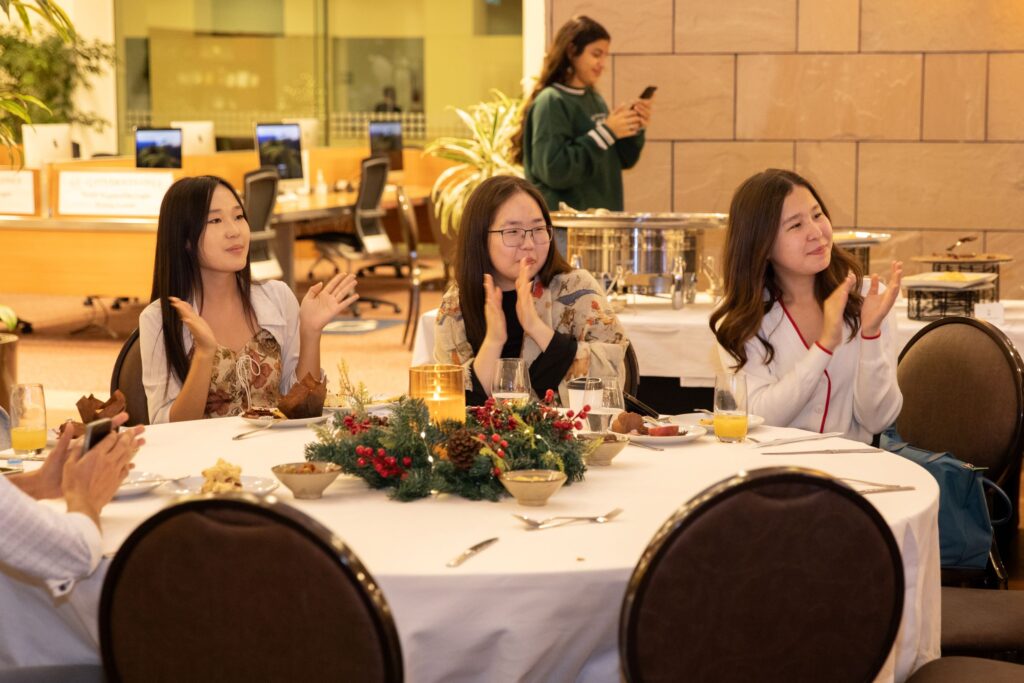Georgetown Qatar Celebrates 20 Years of Interfaith Dialogue in the Middle East

In the absence of snow, roaring fires, and overwhelming commercialism, Georgetown’s campus in Qatar celebrated the winter holidays in their own special way: by celebrating community in the diversity of faith and cultural traditions that make Qatar a highly sought-after destination to study international affairs.
From Ramadan tents and Eid celebrations, to Diwali, and other observations, holidays are a way of sharing traditions, and making GU-Q students and employees–who hail from more than 50 countries– feel welcomed as part of the Desert Hoya family. The holiday gathering at the end of the fall semester was one such opportunity to gather, share, and make community memories.
“Guided by Georgetown’s Jesuit principles and our commitment to interfaith values, we gather to honor understanding and hope in a world that calls for them now more than ever,” said Dean Safwan Masri, at the event opening. An interfaith conversation on “Religious Values and Community Building” set the tone for the evening, where faculty and students from diverse faith communities explored shared values across religious traditions as a source of strength in challenging times.
“As a Jesuit Catholic university in a Muslim-majority nation, we are privileged to exist at the confluence of two rich traditions: the Jesuit ideals of service, reflection, and care for the common good, and the deeply rooted Islamic principles of community, justice, and compassion.” said panel moderator and Class of 2024 graduate Pragyan Acharya, adding: “This intersection is not a mere coincidence; it is a living dialogue, one that challenges and inspires us every day.”
Student panelists Natali Fanik (SFS’25), and Mena Abdelhady (SFS’28) discussed how intercultural exchanges help them feel welcomed as a valued member of the community. “As an Arab Christian, I felt honored to participate in the panel. Our community is small, so being able to represent it and share my connection to it was a meaningful experience,” reflected Natali. It was an important exchange for her classmate Mena, who said: “In the absence of dialogue, people are often guided by misconceptions, tending to fixate on the differences they believe exist between them. Dialogue allows us to find commonalities and brings us together.”
The panel was anchored by two professors of theology who have been cultivating a culture of interreligious dialogue at GU-Q for more than a decade: Dr. Ayman Shabana, a specialist in Islamic ethics and law, and Dr. Akintunde Akinade, a scholar of African Christianity and Christian-Muslim relations. They reflected on how fostering engagement with the moral and ethical teachings of faith traditions through research and collaborative events has helped to build bridges in the classroom and beyond. “Faith is an important part of our identity. Learning more about each other is a necessary step to achieve mutual understanding and to recognize and reinforce shared communal values,” said Dr. Shabana.
Having this discussion during the holiday season was especially poignant, reflected Dr. Akinade. “The celebration evokes happy moments and memories and contributes to the community’s holistic well-being,” he said. The result was a profound community-building experience that found joyful expression in the activities that followed, including a choir performance, cookie decorating, a tree lighting ceremony, and a shared meal, helping students relax and connect at the end of a busy semester.
“It was such a warm and cozy experience – it truly felt like a big family gathering!” said second-year student Lyailya Nurpeissova from Kazakhstan. “Everything about the evening made me feel happy and included. It was wonderful to see everyone coming together, sharing laughs and smiles, especially with exams approaching.”


A value-based education has been one of the strengths of Georgetown’s offerings in Qatar since its inception. Early talks about bringing the Jesuit institution to Qatar 20 years ago included conversations about shared values between Islam and Christianity ingrained in Georgetown’s educational ethos, such as service to humanity, championing justice, engaging in interfaith dialogue, and cultivating intercultural understanding.
Today after two decades in the region, GU-Q has proudly educated more than 1,000 students to live their values as leaders in service to humanity. As Pragyan adeptly observed based on his own experience, the source of this success is how students are taught to live their values through engaging with difference. “At its core, dialogue is a precursor to action, providing the clarity and shared purpose necessary to address challenges and build stronger communities,” he said.